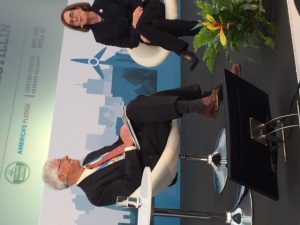First I have to note how well organized the COP has been. From events to registration to transportation, nothing has been difficult to find or figure out. I guess the excellence of ‘German engineering’ applies to event planning as well as automotive design.
I will be spending this week of the COP exploring the side events and meetings at Bonn Zone and given the offerings, I probably won’t get to everything. If the Bula Zone where negotiations are happening is the ‘heart’ of COP 23, then the Bonn Zone is the ‘life blood.’

Bonn Zone
The number of side events at the Bonn Zone is amazing. From countries to organizations to businesses, it seems like every issue related to climate change is covered or at least highlighted. It seemed easy to get overwhelmed so I started my day with just getting a feel for the offerings by walking around the Bonn Zone.
I had expected the side events to only represent observer organizations and other non-state stakeholders, so I was surprised to see countries hawking their climate change agenda.

However, this proved a great opportunity to get, at least a high level view of how countries were addressing climate change. I dropped into the Pakistan area and simply asked what they were doing to address climate change. Interestingly, in addition to an outline of the nation’s climate action plan, I also heard what could be called a ‘developing nation disclaimer’: “we’re not responsible for climate change but we’re committed to addressing it.” Disclaimer aside, I learned about the very real challenges confronting Pakistan in the form of smog, heat waves and deforestation, and the country’s creation of a national climate council, reforestation efforts tied to development projects and other efforts.
I also stopped in on a High Level Meeting sponsored by the Marrakesh Partnership for Global Climate Action. The a panel with representatives from Uganda, St. Lucia, the Philippines and Fiji, as well as the Deputy Director of UNEP discussed “Why climate resilience matters?”

For the most part, the answers to the moderator’s questions were what you’d expect from a conversation on resilience, but the Bonn Zone is full of opportunities to learn and this discussion was not different. Usually when I think about vulnerable communities, my mind goes to women, children, impoverished persons/ communities and similar groups. What I hadn’t considered was the impact of Climate Change on disabled persons.

In an elegantly signed response, a panelist broadly representing the Philippines’ deaf and disabled communities discussed the impacts of climate change and challenges of climate resilience for, what he called, ‘most vulnerable’ community. I’m relatively certain that I was not alone in thinking that I had overlooked a huge issue as the panelist explained that Climate Change dangers are magnified for the disabled and discussed the need for greater inclusivity in the design and implementation of resilience measure addressing this communities needs. I left the discussion with a greater understanding of the breadth of the climate change challenge and a new appreciation for those addressing it on the ground.
I ended my first day at the COP by sitting in on a series of panel discussions at the US Climate Action Center, the subnational response to Trump’s planned withdrawal from the Paris Agreement. The overarching message was not surprisingly “we are still in.”

Governor Panel: State Actions, Goals and Collaborations with Oregon Governor Kate Brown

Policy Advisors Panel: State Actions, Goals and Collaboration with Stephanie Zawistowski (Sr. Adv., Minnesota); Matt Rodriguez (Secretary, California EPA); George Heyman (Minister of Environment, British Columbia); Moderator; Samuel Lemmo (Administrator, Office of Conservation and Coastal Lands, Hawaii)

U.S. Climate Action: Businesses Leading the Way with Cathy Woollums, Senior VP, Bershire Hathaway; Kevin Rabinovitch, Global Sustainability Director, Mars; Abyd Karnali, Managing Director Climate Finance, Bank of America; Melissa Lavinson, VP Federal Affairs and Policy, PG&E; David Eichberg, Sustainability and Social Innovations Lead, HP; Michelle Patron, Director of Sustainability Policy, Microsoft.
Over the course of three panels, it was made clear that despite presidential proclamations and federal action, that many city, state and business leaders remained committed to the Paris Agreement and long-term sustainability goals. Perhaps, Oregon Governor Kate Brown said it best when she described states as “the petri dishes of climate change innovation.”

Leave a Reply